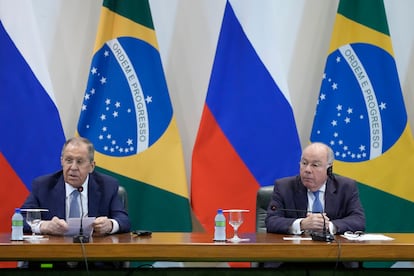Russian foreign minister’s meeting with Brazilian President Lula rankles the West
Sergei Lavrov thanked Brazil for its efforts to seek an end to the war in Ukraine but Washington criticized Brasilia for ‘parroting Russian and Chinese propaganda’

Brazil on Monday gave a state reception to Russian Foreign Minister Sergei Lavrov, who was placed under U.S. and European Union sanctions the day after the Kremlin launched a full-scale invasion of Ukraine on February 24, 2022. According to the veteran diplomat, Moscow’s aim is to conclude the war as swiftly as possible. “As for the process in Ukraine, we are grateful to our Brazilian friends for their excellent understanding of this situation’s genesis. We are grateful [to them] for striving to contribute to finding ways to settle it,” Lavrov said at a press conference alongside his Brazilian counterpart, Mauro Vieira. During his visit to Brazil, Lavrov also met with Brazilian President Luiz Inácio Lula da Silva, who has been at the forefront of a proposal to create a group of non-aligned nations to encourage Vladimir Putin and Volodymyr Zelenskiy to seek a negotiated peace to end the war.
The Brazilian leader believes the time has come to end arms sales to Ukraine in favor of seeking a route toward peace based on diplomacy and negotiation. As such, he has put forward the idea of creating a “G20 for peace,” consisting of neutral states to encourage Moscow and Kyiv to the negotiating table. “The United States needs to stop encouraging war and start talking about peace; the European Union needs to start talking about peace so that we can convince Putin and Zelenskiy that peace is in the interest of everyone and that war is only interesting, for now, to the two of them,” Lula said on April 15 during a visit to Beijing.
Lula has been promoting the idea of a group of non-aligned nations in bilateral meetings and during telephone calls with the leaders of the U.S., China, France and even Zelenskiy, but his proposal so far has been met with indifference by Kyiv and its allies.
Lavrov’s trip to South America, which will also take the diplomat to Venezuela, Cuba and Nicaragua, began just hours after a Russian court sentenced opposition leader Vladímir Kara-Murza to 25 years in jail. His reception by the Brazilian president is also likely to intensify anger toward Brasília from Washington and the European Union, who Lula has accused of “encouraging war” and prolonging the conflict by arming Kyiv.
“Brazil has substantively and rhetorically approached this issue by suggesting that the United States and Europe are somehow not interested in peace or that we share responsibility for the war,” National Security Council spokesperson John Kirby told reporters in Washington after Lavrov’s meeting with Lula and Vieira. “In this case, Brazil is parroting Russian and Chinese propaganda without at all looking at the facts.”
An EU spokesperson added that “Russia, and only Russia, is responsible for the illegitimate and provocative aggression against Ukraine; there is no doubt who is the aggressor and who is the victim,” adding that the delivery of war materiel to Kyiv “is to help Ukraine exercise its right to self-defense, because otherwise Ukraine risks being destroyed.”
Brazil has condemned Moscow’s invasion of Ukraine at the United Nations but is against sanctions and has rejected requests to provide munitions to the Ukrainian war effort. During his meeting with Lavrov, Lula criticized the sanctions imposed upon the Kremlin, which he described as “unilateral and not approved by the United Nations.”
Brazilian diplomacy adheres to a deep-rooted tradition of neutrality. Since the Cold War, it has always avoided aligning itself with one of the major blocs, preferring to maintain cordial relations with as many countries as possible. But now, beyond those efforts to maintain an independent profile, some of Lula’s statements on the Ukraine war are ruffling feathers in the West: his remarks on the roles of the U.S., the EU and Ukraine in the war are perceived in Washington, Brussels and Kyiv as an indication that his position is slanted towards Russian interests. During his recent visit to China and Abu Dhabi, the Brazilian leader suggested Ukraine could cede Crimea — illegally annexed in 2014 by Moscow — to end the war.
Critics have argued that Brazil’s position aims to avoid confronting a key supplier of fertilizer for its soybean plantations, exports from which are largely destined for China. Both Russia and China hold permanent seats on the U.N. Security Council, and Brazil for decades has sought to join them. Lavrov told reporters on Monday that Russia is backing Brazil’s bid.
Brazil’s foreign minister told reporters that Russia accounts for one-quarter of the South American nation’s fertilizer imports, and that he and Lavrov discussed measures to guarantee its influx.
Sign up for our weekly newsletter to get more English-language news coverage from EL PAÍS USA Edition
Tu suscripción se está usando en otro dispositivo
¿Quieres añadir otro usuario a tu suscripción?
Si continúas leyendo en este dispositivo, no se podrá leer en el otro.
FlechaTu suscripción se está usando en otro dispositivo y solo puedes acceder a EL PAÍS desde un dispositivo a la vez.
Si quieres compartir tu cuenta, cambia tu suscripción a la modalidad Premium, así podrás añadir otro usuario. Cada uno accederá con su propia cuenta de email, lo que os permitirá personalizar vuestra experiencia en EL PAÍS.
¿Tienes una suscripción de empresa? Accede aquí para contratar más cuentas.
En el caso de no saber quién está usando tu cuenta, te recomendamos cambiar tu contraseña aquí.
Si decides continuar compartiendo tu cuenta, este mensaje se mostrará en tu dispositivo y en el de la otra persona que está usando tu cuenta de forma indefinida, afectando a tu experiencia de lectura. Puedes consultar aquí los términos y condiciones de la suscripción digital.








































